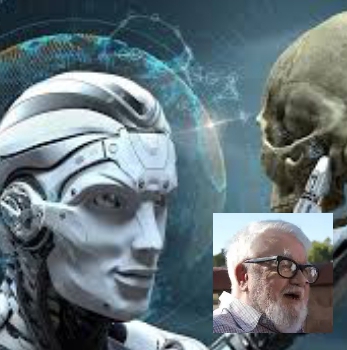What Future Does Artificial Intelligence AI Have Over Human Intelligence?
There are high rises in the growth and development of technologies that have the potential to become veritable tools in place of businesses, organizations, institutions, and fields of study, among others. The emergence of AI has birthed doubts about the future of the proactive application of human intelligence in the various spheres of life. This skeptical presupposition has become a major concern to scholars and researchers in Africa and the world at large.
AI which refers to Artificial Intelligence comprises every form of robotic machine that can function in place of human intelligence in the creation and manipulation of ideas, and problem-solving. AI is interested in a position to overwhelm Human Intelligence HI in different endeavors if not properly fitted with each other.
Before the discovery of AI in the 1950s by John McCarthy, the management and execution of man’s engagements depended on the holistic approach to the exploration of Human Intelligence. Consequently, the birth of AI has rapidly redefined how individuals, groups, organizations, companies, and government agencies operate. This sharp turnaround in all sectors of society can be said to be a welcome development regarding the great import of AI has been a sequel to the invention of what is popularly referred to as computer (ígwe òme ka mmadu), in the Igbo Language.
AI is distinguished from the HI based on its varipotentialials for handling problems. It’s pertinent to acknowledge that first, AI is the byproduct of human intelligence which was conceived by Mc Carty to assist in the creation of ideas and the solving of problems especially in the absence of human intelligence. Little wonder science and technology are phenomenal in proferring practical solutions to the myriad of issues that distort human society.
Reliability is one of the attributes of AI which differentiates it from HI. Once, robots are properly positioned on duty, there’s a 100 percent guarantee that the tasks will be executed in the best form and practice. This may not be obtainable in HI. Individual discrepancies as well as unforeseen circumstances can defy the reliability of HI which in turn deter the effectiveness of activities in the discharge of their duties.
Accuracy is another vital component of AI that can overwhelm HI in various fields of exhibitions. AI is reliably accurate in solving problems. This is of no doubt, especially in the pragmatic handling of issues. With the help of AI, one can access accurately any part of the world through Google Maps. This is also evident in the military, where sophisticated arms are made to function with the assistance of AI. The use of such arms including missiles, Snippers, etc, has been proven to be more accurate and consistently reliable than a man.
Speed is another major distinguishing feature of AI enabling them to do tasks nonstop. The speed of HI can not compare the AI in the course of execution of tasks or responses to issues of urgency.
Moreover, AI has a larger storage capacity for information and ideas that supersedes HI. This also draws credence to the points mentioned earlier, which corroborates the reliability of the AI. While HI can be forgetful and weak, AI does not forget and be deterred by weakness. Unlike HI which can be affected by the salinity, AI remains active so far it’s serviced and put in order.
Although Artificial Intelligence has gained a very undeniable position of importance in every aspect of humanity, it would amount to sheer ignorance if we fail to acknowledge the irreplaceable roles of Human Intelligence in every sector of human society.
First, the health Sector: The human health care system is one of the most important aspects of life that requires a concerted effort to ensure functionality and standards for the benefit of all. This gives credence to the persistent need for professional health personnel that would be Manning various healthcare systems, instead of acquiring and letting the healthcare centers be managed by Artificial of Artificial Intelligence.
The educational sector can not function without human intelligence. Imagine attending lectures where robots teach or doing away with hardcopy books, texts, etc, replacing it with an E-book. The health effects of it may be detrimental to students and readers of all kinds.
Also, the political and leadership spheres of society can not afford to function in the absence of human intelligence. The issues of the decision-making process, idealization of laws of the land, interpretation of the laws, as well as the implementation of the constitutions can only be achieved by the pragmatic role of human intelligence.
In a nutshell, the advancement of Artificial Intelligence can greatly facilitate the functionality of human intelligence by reducing the workload and tasks to be carried out by human beings. Thus, with the sudden growth in appreciation of AI, and its futuristic tendencies, the position of human intelligence will continue to be redefined to stabilize the full development of AI for the benefit of man. This, however, requires the repositioning of human intelligence to enable a healthy accommodation of AI in various sectors of society and the world at large.
Given the above-mentioned, AI will not and cannot subdue HI in as much as it would continue to advance to redefine the position of HI. All accolades to the brainchild of AI.
